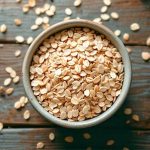Takeaways
- Avena sativa offers potential health benefits but can cause side effects
- Common side effects include digestive issues and allergic reactions
- Proper dosage and quality control are essential for safe use
- Long-term use may require monitoring for effectiveness and tolerance
- Consult a healthcare provider before adding Avena sativa to your routine
- Sustainable sourcing supports both personal and environmental health
Understanding Avena Sativa
Avena sativa, or oats, is a grain with diverse uses.[1] People commonly eat it for breakfast and use it in health supplements.[2] It has become a popular choice in health and wellness.
Oats have a long history as a source of nourishment. They have been a staple food for many centuries.[3] Today, people recognize them for potential health advantages that go beyond basic nutrition.
Avena sativa contains substances that may promote well-being, such as beta-glucans, avenanthramides, and saponins.[4] Each of these contributes to how the plant affects the body.
Nutritional Profile
Macronutrients
Avena sativa provides a balanced mix of nutrients. It includes carbohydrates, proteins, and fats.[5] This combination makes it a food that can provide lasting energy and keep you feeling full.
The protein found in Avena sativa is considered high-quality, containing all nine essential amino acids that the human body cannot produce itself.[6] This makes it a good protein choice for vegetarians and vegans.
Essential amino acids found in Avena sativa include:
- Histidine
- Isoleucine
- Leucine
- Lysine
- Methionine
- Phenylalanine
- Threonine
- Tryptophan
- Valine
Micronutrients
Avena sativa is a good source of vitamins and minerals.[7] It offers a wide range of nutrients needed for overall health. These support various functions within the body.
| Nutrient | Amount per 100g | % Daily Value |
|---|---|---|
| Manganese | 4.9 mg | 213% |
| Phosphorus | 523 mg | 52% |
| Magnesium | 177 mg | 42% |
| Copper | 0.6 mg | 67% |
| Iron | 4.7 mg | 26% |
| Zinc | 4 mg | 36% |
| Folate | 56 mcg | 14% |
| Vitamin B1 | 0.8 mg | 67% |
These nutrients contribute to maintaining strong bones, producing energy, and supporting the immune system.[8] They also help the nervous system and promote healthy skin.
Health Benefits
Heart Health
Avena sativa might support heart health in different ways. It may help lower cholesterol, which is beneficial for the heart.[9] The fiber in oats is important for this effect.
Beta-glucans, a type of soluble fiber in oats, are particularly helpful. They can help reduce LDL or ‘bad’ cholesterol.[10] This reduction could lower the risk of developing heart disease.
Research backs up claims about the heart-healthy benefits of oats. One review of 58 studies concluded that eating oats significantly reduced total and LDL cholesterol.[11]
Blood Sugar Control
Avena sativa could help with managing blood sugar levels. It has a low glycemic index, which means it doesn’t cause quick rises in blood sugar.[12] This is particularly useful for people with diabetes or at risk of developing the condition.
The fiber in oats slows down digestion and the absorption of carbohydrates.[13] This results in a more gradual increase in blood sugar after meals and may improve how the body responds to insulin.
Here are steps showing how Avena sativa can affect glucose metabolism:
- Slows gastric emptying
- Reduces glucose absorption
- Improves insulin sensitivity
- Lowers postprandial glucose response
- Helps maintain steady blood sugar levels
Digestive Health
Avena sativa can positively affect the digestive system. Its high fiber content helps with regular bowel movements.[14] It also feeds beneficial gut bacteria which supports a healthy gut microbiome.[15]
The beta-glucans in oats work as prebiotics, which feed good bacteria in the gut.[16] This can lead to better digestive function and improved overall gut health.
Digestive problems that Avena sativa might help to relieve include:
- Constipation
- Irregular bowel movements
- Irritable bowel syndrome symptoms
- Inflammatory bowel conditions
Common Side Effects
Digestive Discomfort
Some people may experience digestive discomfort after eating Avena sativa, such as bloating, gas, or stomach cramps.[17] These effects are usually mild and temporary.
The high fiber content in oats can cause these issues. If you are not used to a diet high in fiber, your body may need some time to adjust.[18] Gradually increasing fiber intake can help reduce these effects.
To minimize digestive issues, begin with small portions of Avena sativa and increase them slowly. Drinking enough water can also help your body process the added fiber.
Allergic Reactions
Though rare, some people may have allergic reactions to Avena sativa.[19] These can be mild or severe. It’s important to be aware of the signs of a possible allergic response.
Allergies to oats may sometimes occur because of cross-contamination with wheat.[20] This is more common in people with celiac disease or gluten sensitivity. If this is a concern, look for certified gluten-free oats.
Symptoms that might indicate an allergic reaction include:
- Skin rash or hives
- Itching or tingling in the mouth
- Swelling of lips, tongue, or throat
- Difficulty breathing
- Nausea or vomiting
- Dizziness
Nutrient Interactions
Avena sativa can affect how your body absorbs certain nutrients. This is mainly due to its phytic acid content, which can bind to minerals and make them less available for absorption.[21]
| Nutrient | Interaction | Effect |
|---|---|---|
| Iron | Decreased absorption | May contribute to iron deficiency |
| Zinc | Decreased absorption | Could lead to zinc deficiency |
| Calcium | Mild decrease in absorption | Minimal impact on calcium status |
| Magnesium | Slight decrease in absorption | Generally not a concern |
To lessen these effects, try consuming Avena sativa with foods rich in vitamin C. This can improve iron absorption.[22] Soaking or fermenting oats before eating them can also reduce phytic acid levels.[23]
Less Common Side Effects
Skin Reactions
Some people might experience skin reactions after using Avena sativa, whether applied topically or consumed orally.[24] Such reactions are generally not very common.
Oat-based products are often used on the skin for their soothing effects. Oatmeal baths can help relieve itching and irritation.[25] But in some rare cases, they might cause contact dermatitis in sensitive individuals.
Research on Avena sativa and skin health is mostly positive, with studies showing its anti-inflammatory properties can benefit different skin conditions.[26] However, individual responses can vary.
Hormonal Effects
Avena sativa may have mild effects on hormone levels in some people.[27] This is an area of continuing research with mixed results so far. Any effects are generally subtle.
Some studies suggest that Avena sativa might influence testosterone levels. One study found a slight increase in free testosterone in men.[28] However, more research is needed to confirm these findings.
The impact on estrogen levels is less clear. Some sources suggest that Avena sativa has estrogenic properties, but scientific evidence is limited.[29] More studies are needed to fully understand these potential effects.
Safe Use Guidelines
Recommended Dosage
The proper dose of Avena sativa depends on different factors. These include the form of the supplement, your health goals, and your personal tolerance.[30] There isn’t a single recommended dose for everyone.
For whole oats as food, a typical serving is about 1/2 cup of dry oats.[31] This provides about 150 calories and 4 grams of fiber. For oat extracts or supplements, follow the manufacturer’s instructions.
Steps to determine the right dose for your needs include:
- Consult with a healthcare provider
- Start with a low dose
- Monitor for any side effects
- Gradually increase if needed
- Adjust based on your body’s response
Precautions
Some people should use Avena sativa with caution. This includes those with celiac disease or gluten sensitivity.[32] While oats are naturally gluten-free, cross-contamination can happen during processing.
Avena sativa could interact with certain medications, potentially affecting how the body absorbs some drugs.[33] Always tell your healthcare provider about any supplements you take.
Conditions that require caution when using Avena sativa include:
- Celiac disease
- Gluten sensitivity
- Diabetes (may need to adjust medication)
- Digestive disorders
- History of allergies to grains
Quality and Purity
Choosing high-quality Avena sativa products is important for safe use. Look for supplements that have been tested by a third party for purity and strength.[34] This helps make sure you’re getting what the label says.
Contaminants can sometimes be a concern with plant-based supplements. These may include heavy metals or pesticide residues.[35] Choosing organic products can help reduce these risks.
Things to look for when buying Avena sativa supplements include:
- Third-party testing certification
- Good Manufacturing Practices (GMP) certification
- Organic certification (if possible)
- Clear labeling of ingredients and dosage
- Reputable brand with good customer reviews
Forms and Preparation
Whole Oats
Whole oats are the most common form of Avena sativa. They come in different forms, from whole oat groats to instant oats.[36] Each type has slightly different nutritional qualities and cooking times.
The processing level affects the oats’ glycemic index.[37] Less processed forms, like steel-cut oats, tend to have a lower glycemic index and retain more of their original nutrients.
Cooking methods can affect the nutritional value of oats. Boiling is the most common method. Some people prefer overnight oats, which involves soaking oats in liquid overnight, making them easier to digest.
Oat Extracts
Oat extracts are concentrated forms of specific compounds found in Avena sativa.[38] These are often used in supplements or skincare products. They offer targeted benefits without the bulk of whole oats.
Extracts differ from whole oats in their concentration of active compounds.[39] They might have higher levels of beta-glucans or avenanthramides. This can make them more potent for specific uses.
| Type of Extract | Main Compounds | Common Uses |
|---|---|---|
| Beta-glucan extract | Beta-glucans | Cholesterol lowering, immune support |
| Avenanthramide extract | Avenanthramides | Skin care, anti-inflammatory |
| Oat protein extract | Proteins | Sports nutrition, meal replacements |
| Oat oil extract | Lipids | Cosmetics, skin moisturizing |
Topical Applications
Avena sativa is a common ingredient in skincare products. It is known for its soothing and moisturizing qualities.[40] Many people use oatmeal baths to relieve skin irritation.
Colloidal oatmeal, a finely ground form of oats, is often used in lotions and creams. It forms a protective layer on the skin.[41] This can help with conditions like eczema or dry skin.
Using Avena sativa topically is generally safe for most people. However, some might experience skin irritation.[42] Always test new products on a small area of skin first before applying them to larger areas.
Long-term Use Considerations
Sustainability
The production of Avena sativa has environmental effects. Like any crop, it requires land, water, and energy to grow and process.[43] However, oats are generally considered a sustainable crop.
Oats need less water than many other grains and require fewer pesticides.[44] This makes them an environmentally friendly option compared to some other crops.
Consumers can support sustainable Avena sativa production through their choices. Buying organic oats or products from companies that use sustainable practices can help. Supporting local farmers who use sustainable methods is another option.
Tolerance and Effectiveness
With long-term use of any supplement, including Avena sativa, the body may develop a tolerance, becoming less responsive to its effects over time.[45] Effectiveness might also change.
For some benefits, like cholesterol reduction, long-term use is needed.[46] However, the extent of the effect may level off after a certain time. Regular monitoring can help track ongoing effectiveness.
Steps to maintain the benefits of Avena sativa with long-term use include:
- Regularly reassess your needs and goals
- Vary your sources of Avena sativa
- Combine with other healthy lifestyle practices
- Take occasional breaks if appropriate
- Consult with a healthcare provider for ongoing monitoring
FAQ
These questions reflect common concerns about Avena sativa, covering safety, effectiveness, and practical usage. It is important to remember that individual responses can differ. While this FAQ provides general information, it is not a substitute for medical advice. Always speak with a healthcare provider for personalized advice about using Avena sativa.What is Avena sativa?
Can Avena sativa help with anxiety?
Is Avena sativa gluten-free?
How does Avena sativa affect cholesterol levels?
Can Avena sativa cause weight gain?
Are there any drug interactions with Avena sativa?
Conclusion
Avena sativa provides many potential health advantages. It can help with heart health, blood sugar management, and improved digestion. Its rich nutrient profile makes it a helpful addition to most diets.
However, like any supplement or food, Avena sativa can cause side effects in some people. These are usually mild and often related to its high fiber content. Allergic reactions, though rare, are possible.
Using Avena sativa safely involves choosing high-quality products and using them in appropriate amounts. It’s good to start with small amounts and increase them gradually. This allows your body to adjust and minimizes potential side effects.
Long-term use of Avena sativa is generally safe for most people. However, it’s important to monitor its effectiveness over time. Checking in with your healthcare provider can ensure it continues to meet your health needs.
Sustainability is another important factor to consider with long-term use. Choosing responsibly sourced Avena sativa supports both personal and environmental health. This holistic approach aligns with the overall health benefits of oats.
In summary, Avena sativa can be a beneficial addition to your health routine when used appropriately. By understanding its effects, benefits, and risks, you can make informed choices about its use. As always, personalized advice from a healthcare professional is the best guide for your specific health journey.
Oats, scientifically known as Avena sativa, are a widely cultivated cereal grain used for both human consumption and animal feed.
Oats are frequently consumed as oatmeal, granola, and other breakfast cereals. They’re also incorporated into dietary supplements and health products.
Oats have been part of the human diet for millennia, with evidence of cultivation dating back to the Bronze Age.
These compounds are associated with various health benefits, including cholesterol reduction (beta-glucans) and antioxidant effects (avenanthramides).
Source: “Effect of Oat β-Glucan Intake on Glycaemic Control and Insulin Sensitivity of Diabetic Patients: A Meta-Analysis of Randomized Controlled Trials” https://www.ncbi.nlm.nih.gov/pmc/articles/PMC4728652/
Oats are a good source of complex carbohydrates, contain some protein, and also contain unsaturated fats, making them a relatively balanced food source.
Oats are a source of all nine essential amino acids but are lower in lysine compared to other sources, so relying solely on oats for protein may not be optimal without a varied diet.
Source: “The comparison of polymorphism among Avena species revealed by retrotransposon-based DNA markers and soluble carbohydrates in seeds” https://www.ncbi.nlm.nih.gov/pmc/articles/PMC10076396/
Oats provide several important vitamins and minerals such as manganese, phosphorus, magnesium, iron, and B vitamins.
The minerals such as phosphorus and magnesium contribute to bone health, B vitamins play a role in energy production and minerals like zinc aid immune function.
The beta-glucan fiber in oats can lower LDL cholesterol levels, reducing the risk of heart disease. This is a recognized health benefit of oats.
Beta-glucan is a soluble fiber found in oats which reduces the amount of LDL cholesterol absorbed by the body by forming a viscous gel in the digestive tract
Source: “Effects of Oat Beta-Glucan Intake on Lipid Profiles in Hypercholesterolemic Adults: A Systematic Review and Meta-Analysis of Randomized Controlled Trials” https://www.ncbi.nlm.nih.gov/pmc/articles/PMC9147392/
Meta-analysis and reviews of oat consumption have shown a statistically significant decrease in total and LDL cholesterol
Source: “Effect of oat supplementation interventions on cardiovascular disease risk markers: a systematic review and meta-analysis of randomized controlled trials” https://www.ncbi.nlm.nih.gov/pmc/articles/PMC9106631/
The soluble fiber in oats slows down glucose absorption, leading to a more gradual increase in blood sugar levels. Oats can be helpful for people with diabetes or insulin resistance.
The soluble fiber in oats forms a gel in the digestive tract which slows down digestion and the subsequent absorption of carbohydrates and glucose.
The fiber in oats adds bulk to stool and aids in regularity, helping prevent constipation.
Oats are a good source of prebiotic fiber, which nourishes beneficial gut bacteria and supports a balanced gut microbiome.
Beta-glucan fiber is a source of food for beneficial gut bacteria, promoting a healthy gut flora and contributing to digestive health.
Due to their high fiber content, consuming oats can cause gas, bloating or cramping, especially in individuals who are not used to high-fiber diets.
The high fiber content in oats can cause gastrointestinal distress if consumed in large amounts before the body adjusts to a high-fiber diet. Gradually introducing fiber to the diet can help to mitigate this.
Although relatively uncommon, some people can be allergic to oats. Symptoms can range from mild to severe and can include skin reactions, gastrointestinal symptoms and anaphylaxis in some cases.
Oats are often grown or processed in facilities that also handle wheat. This can result in cross-contamination and cause reactions in individuals with wheat allergies or celiac disease.
Phytic acid, found in oats, can bind to certain minerals in the digestive tract which can limit their absorption. Soaking or fermenting oats prior to consumption can help to reduce this effect.
Source: “Environmental impact of phytic acid in Maize (Zea mays. L) genotypes for the identification of stable inbreds for low phytic acid” https://www.ncbi.nlm.nih.gov/pmc/articles/PMC7326876/
Vitamin C enhances the absorption of non-heme iron from plant-based foods like oats, helping to counteract the effects of phytic acid.
Soaking, sprouting, or fermenting oats can reduce phytic acid levels, which improves mineral absorption by reducing the phytic acid’s ability to bind to them.
While oats are generally considered gentle on the skin, some individuals may experience irritation, contact dermatitis, or other allergic reactions to topical or ingested oats.
Oatmeal is well-known for its soothing and anti-inflammatory properties. Colloidal oatmeal in particular is often used in baths and lotions to relieve itching and inflammation associated with dry skin and eczema
Research suggests that oats, especially in colloidal form, have anti-inflammatory and soothing properties and can be beneficial for conditions like eczema, dermatitis and dry skin.
Source: “A Review of Health-Beneficial Properties of Oats” https://www.ncbi.nlm.nih.gov/pmc/articles/PMC8625765/
Some limited research indicates that oats might affect testosterone and estrogen levels in some individuals. However, more research is required to fully understand these effects and their significance.
Some research studies have indicated that oats may have a role in slight increases in free testosterone levels in men. However, it is still unclear whether these slight changes have any physiological effects and more research is required.
Source: “Veterinary Herbal Medicine: A Systems-Based Approach” https://www.ncbi.nlm.nih.gov/pmc/articles/PMC7151902/
Some sources mention potential estrogenic effects of oats based on anecdotal evidence and similar compounds found in other plants but research in this area is limited and further studies are needed.
The optimal dose of Avena sativa varies depending on factors such as the formulation (whole grain, extract or supplement), the individual’s health goals and how well they tolerate the product, there isn’t a universal dose that suits everyone.
A 1/2 cup serving of dry oats is often considered an appropriate serving size.
Although oats are naturally gluten-free, cross-contamination can occur if they are grown, processed or packaged in the same facilities as wheat and other gluten-containing grains. People with celiac disease and gluten intolerance should seek out certified gluten-free products.
Due to their fiber content and potential hormonal effects, oats can interact with certain medications such as those for diabetes or high cholesterol by affecting the absorption rate of these medications. It is important to consult with a healthcare professional when taking any medications and also consuming oats.
Selecting products that have been tested by a third party can help to ensure that they have the correct ingredients and potency, and are free of harmful contaminants.
Plant-based supplements may contain contaminants such as heavy metals, pesticides, or other agricultural chemicals. Choosing organic products may help to reduce this risk.
Oats are available in a range of forms, from whole oat groats to rolled oats, steel-cut oats, and instant oats. Each one has different processing levels.
The degree of processing affects how quickly the carbohydrates in oats are digested and absorbed by the body. Minimally processed forms of oats like steel cut oats often have a lower glycemic index than more processed varieties.
Oat extracts can be used in supplements and skincare products. These extracts concentrate the beneficial compounds such as beta-glucan or avenanthramides, and can provide targeted benefits.
Oat extracts often have higher concentrations of active compounds such as beta glucan or avenanthramides than whole oats do. This is why they are often used in supplements and other health products.
Oats are well known for their soothing and moisturizing properties which is why they are commonly added to skincare products for sensitive and irritated skin.
Colloidal oatmeal forms a protective layer on the skin and locks in moisture. It is frequently used in lotions, creams, and other skincare products.
Topical application of oats or colloidal oatmeal is generally safe for most people, though some may experience mild skin irritation, allergic reactions, or contact dermatitis.
Cultivating oats requires land, water, and energy for growing and processing, contributing to environmental impacts. These environmental impacts are lower than other common grains.
Oats are known to be relatively water-efficient and may require less pesticide application than some other grains making them a more environmentally friendly crop.
The body can adapt to supplements over time which may result in reduced effectiveness. More research is needed to determine if this happens with long-term oat consumption.
The cholesterol lowering benefits of oats generally require ongoing consumption to see results, as these benefits are related to the ongoing intake of soluble fiber.
Although there is some anecdotal evidence to suggest that oats may help with stress and anxiety, scientific evidence for this is limited and further research is required.
Oats are gluten-free by nature. However, they are often processed in facilities that also process wheat and other gluten containing grains leading to cross contamination. People with celiac or gluten intolerance should choose certified gluten-free oats.
The soluble fiber beta-glucan in oats binds to cholesterol in the digestive tract which inhibits absorption and helps to lower LDL cholesterol.
Source: “Effect of Oat β-Glucan Intake on Glycaemic Control and Insulin Sensitivity of Diabetic Patients: A Meta-Analysis of Randomized Controlled Trials” https://www.ncbi.nlm.nih.gov/pmc/articles/PMC4728652/
Oats are a source of fiber, and protein, and can contribute to feeling full and satisfied. When included as part of a balanced diet, they are unlikely to cause weight gain, and may in fact contribute to weight management.
Oats can interact with medications for diabetes and high cholesterol due to their fiber content which can affect the absorption rate of these medications. It is important to consult with a healthcare professional before consuming oats if you are on any medications.



